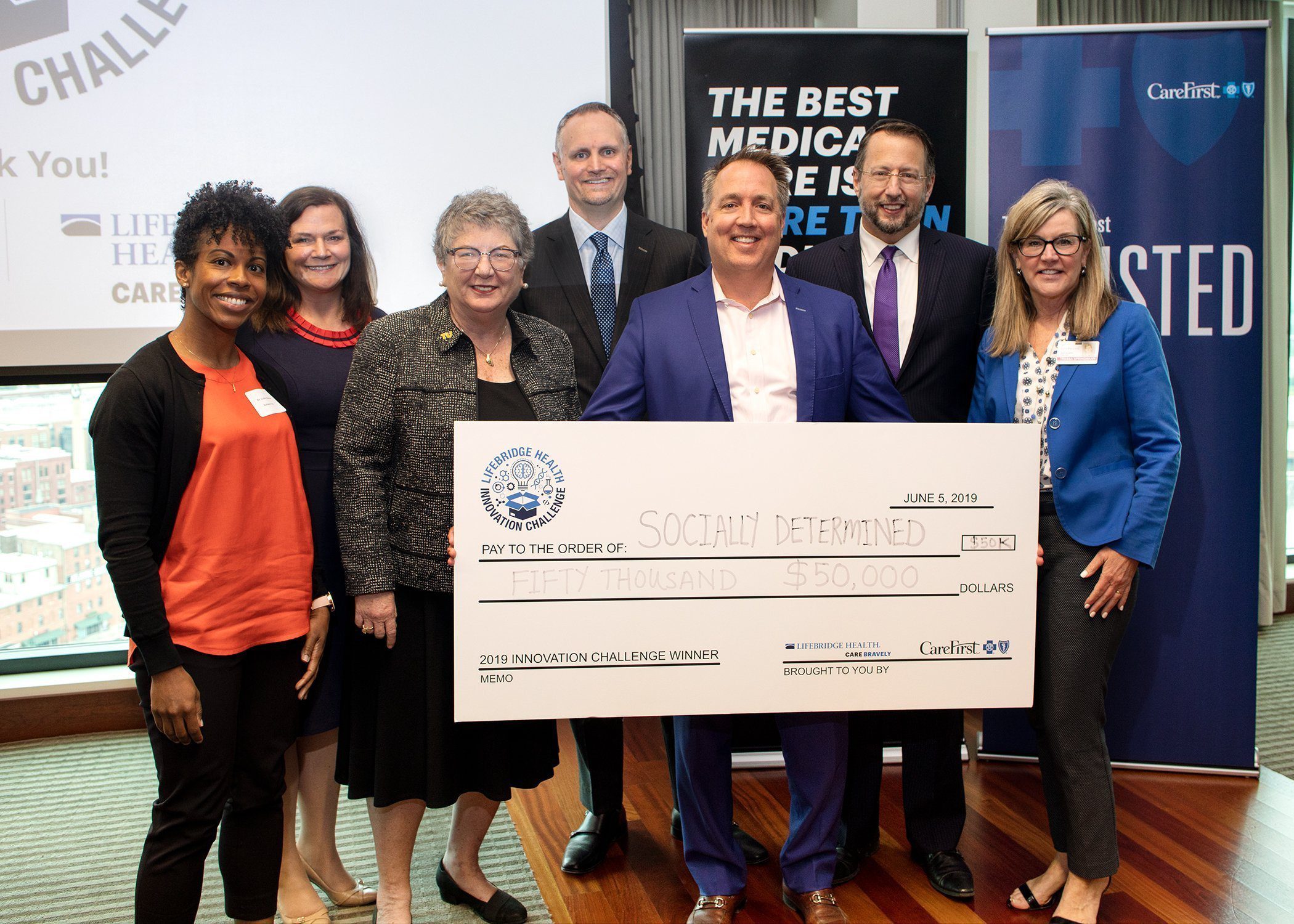
LifeBridge and CareFirst Host Innovation Challenge to Promote HealthTech Solutions
June 11, 2019
One week ago, LifeBridge Health and CareFirst hosted their first ever Health Technology Innovation Challenge. The organizations wanted to create an event to attract and motivate innovators to create solutions for the complex problems of today’s healthcare. The companies recently announced plans to open an incubator dedicated to assisting small healthtech startups.
The goal of the event was to bring out and reward local and national entrepreneurs that are developing digital health technology solutions centered around improving healthcare and lowering the overall cost of care. Innovators across the country and around the country and world rose to the challenge, with over 100 applicants, from 30 cities, and 3 different countries. “The tremendous interest in the challenge is a testament to the fact that Baltimore is an emerging healthcare hub,” says LifeBridge Health’s Executive Director of Innovation & Research, Pothik Chatterjee.

Opening remarks were given by Baltimore City’s Commissioner of Health, Dr. Letitia Dzirasa, “Today we’re here to disrupt health with digital health solutions. It’s that positive disruption that I believe will continue to push the healthcare industry to embrace new technology. I believe that better technology will bolster our results and will result in a positive impact in the communities that we serve.”
The keynote speech was given by Aneesh Chopra, the first United States Chief Technology Officer, and the current President of Care Journey. Chopra spoke to the opportunity for positive changes coming to healthcare as the health internet era is ushered in.
The panel of judges included:
- Brian D. Pieninck, President and CEO of CareFirst BlueCross BlueSheild
- Dr. Letitia Dzirasa, Baltimore CIty Gov Commissioner of Health
- Dr. Jonathan Ringo, President and COO of Sinai Hospital, Sr. VP of LifeBridge Health
- Dr. Kim Schatzel, 14th President of Towson University
- Tressa Springmann, CIO of LifeBridge Health
- Ricardo Johnson, Sr. Director of Healthworx
The pressure was on for the 6 challenge finalists who had to present “Shark Tank” style with only 5 minutes to pitch their ideas, and 5 minutes for a Q&A session with the panel of judges.
The judges awarded the competition winner, Socially Determined with a prize of $50k to continue to develop their platform technology. In addition to the seed funding the company will be collaborating with LifeBridge and CareFirst to pilot their program within Baltimore City.
The 2019 LifeBridge Health & CareFirst Innovation Challenge Winner: Socially Determined
Trenor Williams, CEO and Founder of Socially Determined, presented their platform solution that combines tangible patient claims data to assess patient risk based on their social determinants of health (SDOH). Their technology is the first science based approach to SDOH, and the first risk metrics in the industry. Their platform is able to map communities all across the country down to a 200 meter accuracy based on a nationwide repository generated from the integration of over 130 data sets.
Their technology is able to calculate a patient risk score based upon economic well being, food insecurity, housing insecurity, transportation barriers, crime and violence, and health literacy. This platform technology solution has immense potential to positively impact healthcare by targeting social interventions for the specific needs of socially and clinically complex patients.
The judges faced a difficult decision with 6 innovative companies with the mission to change healthcare with their innovative solutions.
Kermit is a spend management and cost reduction company for implantable medical devices, their goal is to return the power back to the hospital and help bring down healthcare costs. The current method of tracking spending for implantable medical devices has not evolved over the years and solely relies on paper and the honesty of the sales representative that is present for the surgery. There is a disconnect between the key players involved in the system. The surgeon using the device does not know how much it costs, supply chain negotiates the contracts, but can’t do so effectively due to the technical jargon, and the executives who aren’t apart of the pipeline are trying to reduce costs in this area. “This is a broken process that has been the same way for 50 years in our country,” says CEO Richard Palarea. Kermit is a cloud based app that removes the barriers between these three decision makers so they can better collaborate.
Kermit supplies real-time data on implantable medical device transactions to significantly lower costs and improve patient care. The tracking feature can not only reduce costs, but may be life saving. Medical device recalls can be fatal, and patients who move away from their physicians are often unaware if they cannot be reached. Kermit tracks the lot number and is provided on a patient card that they can give to their new physician in the event they relocate. Kermit accomplishes and tracks all of the necessary pieces without workflow interruption, and at a lower cost.
Rubitection is a handheld diagnostic tool designed to detect bedsores in their early stages and minimize the spread of infection. Early detection of bedsores in stage 1 or 2 is nearly impossible, current methods are unreliable and ineffective, especially on dark skin patients. An elderly patient suffered a bad fall and survived, but later died in the hospital of complications from a severe bed sore. The patient’s family was paid out $6.4 million for his wrongful death, but no amount of money can heal the loss of a loved one who’s death could have been prevented. This is unfortunately the case for 60,000 patients all over the country who die needlessly from bedsores. This preventable healthcare condition costs the healthcare system $11 billion in one year. Rubitection’s patented technology sensor system seeks to reduce the number of deaths and complications from bedsores by catching them early when they are treatable.
The Rubitection device is coupled with a mobile healthcare application that allows you to measure incremental changes in the health of the skin to provide personalized patient care. This device improves patient outcomes while allowing payers and providers to reduce spending of treatment and avoid readmission costs. Their low cost device can be used in any care setting and is 75-90% cheaper than its competitors. CEO & Founder Sanna Gaspard says, “If you catch 2 bedsores early, the device pays for itself in the healthcare costs that won’t be incurred from the complications.”

Nest Collaborative was founded by Amanda Gorman, a Nurse Practitioner with a mission to improve maternal and child health with value-driving technology. Nest Collaborative is a program focused on bringing nursing success to women through proper education and improving health by expanding access to payer-reimbursed “telelactation” support.
There has been a societal change where women aren’t having babies as often or as young, so they are not being taught in traditional ways how to breastfeed. The Nest program consists of three visits including prenatal intention, infant discharge, and an at home visit in order to “bring the village back to the mother”. Breastfeeding is important, good for the patient, and can be expensive when it fails.
The event concluded with a panel of experts from the biotech industry, “From BioIncubator to Bedside”, where they panelists discussed how new or developing companies can bring their technologies from the lab to market. The experts gave advice based on their experience in the field with reimbursement strategies, best practices, and an FDA expert was present to discuss the regulatory path to commercialization.
Pilleve has created a pill dispensing device designed to prevent and combat the opioid addiction crisis by monitoring a person’s intake and securely holding the drugs. The dispenser is linked to a smartphone application via a bluetooth connection, it uses integrated data to notify the prescribing doctor how often the patient is dispensing the medication and if the device is tampered with. Obtaining and using the device is simple, when the patient is prescribed the opioid the doctor writes a prescription for the dispenser as well, so when the patient picks up the pain medication, it is already in the dispenser.
Chronic pain patients are most at risk for opioid addiction, so doctors are often hesitant to prescribe the amount and dose the patient actually needs. Pilleve gives the physicians the peace of mind that their patients are not abusing or misusing the medication. For patients that have been in an accident or need opioids for an isolated incident, they are often prescribed far more than they need. Having extra medication lying around the house makes them more vulnerable to recreational use or abuse. “The pilleve dispenser removes this temptation, when the patient returns the device to the pharmacy all of the leftover pills are returned with it and they are disposed of properly and safely,” says CTO & Co-Founder Gautam Chebrolu. The Pilleve device has implications for other medications that are often abused like xanax.
Docket
Docket’s mission is to make it easier for consumers to access manage and share personal and family immunization records. Over the past year and a half the founders have been meeting with experts from different agencies to help understand pain points of accessing health records to create their solution. Tracking down immunization records can be difficult, the CDC has a website dedicated to suggestions of where you might find your records and state and local immunization registries have confidence of record, but few offer access. As more communities require immunizations it will be important for consumers to have ready access to their records.
Currently most states restrict consumers from directly accessing their immunization registries. To combat this Docket’s platform will have providers register on their website, and provide them with a unique code. Patients will then use the Docket phone application to scan the QR code, where the credentials will be confirmed and the records will be available for download to the phone. Once the records are downloaded and stored on the phone, the app will be able to anticipate upcoming immunizations and schedule reminders for the patient. The platform is also intelligent to requery the records behind the scene to confirm they were administered. This platform is scalable and cost effective to implement, with room to grow for new services to patients and providers.




